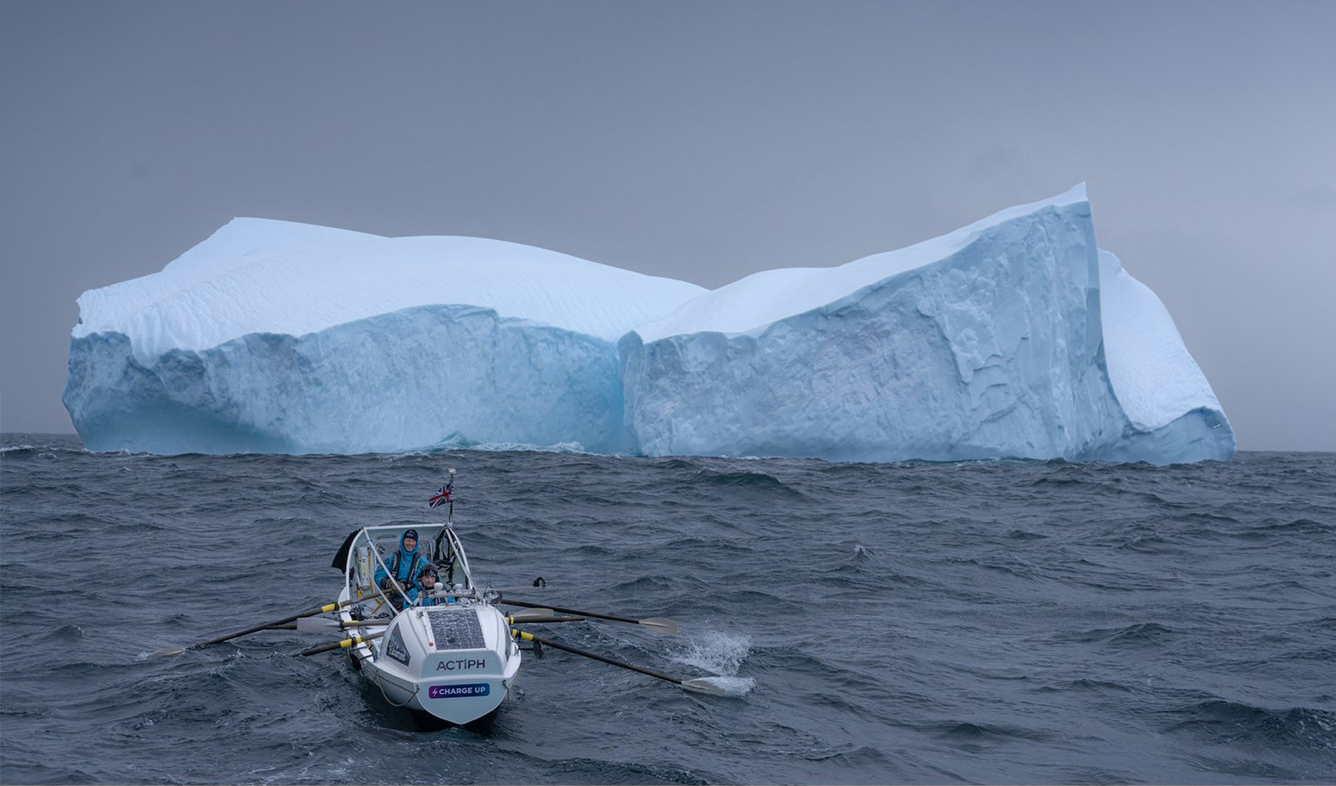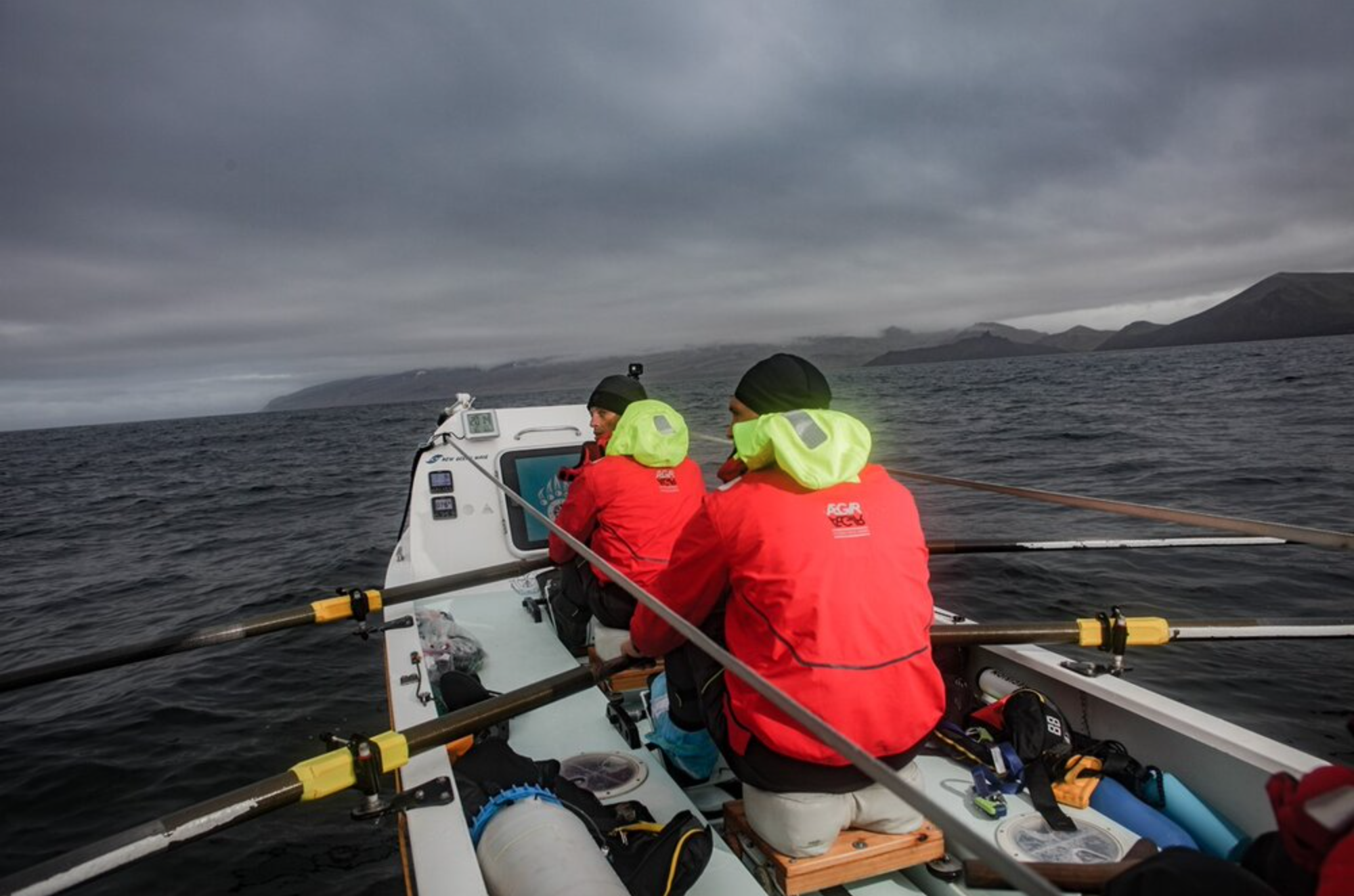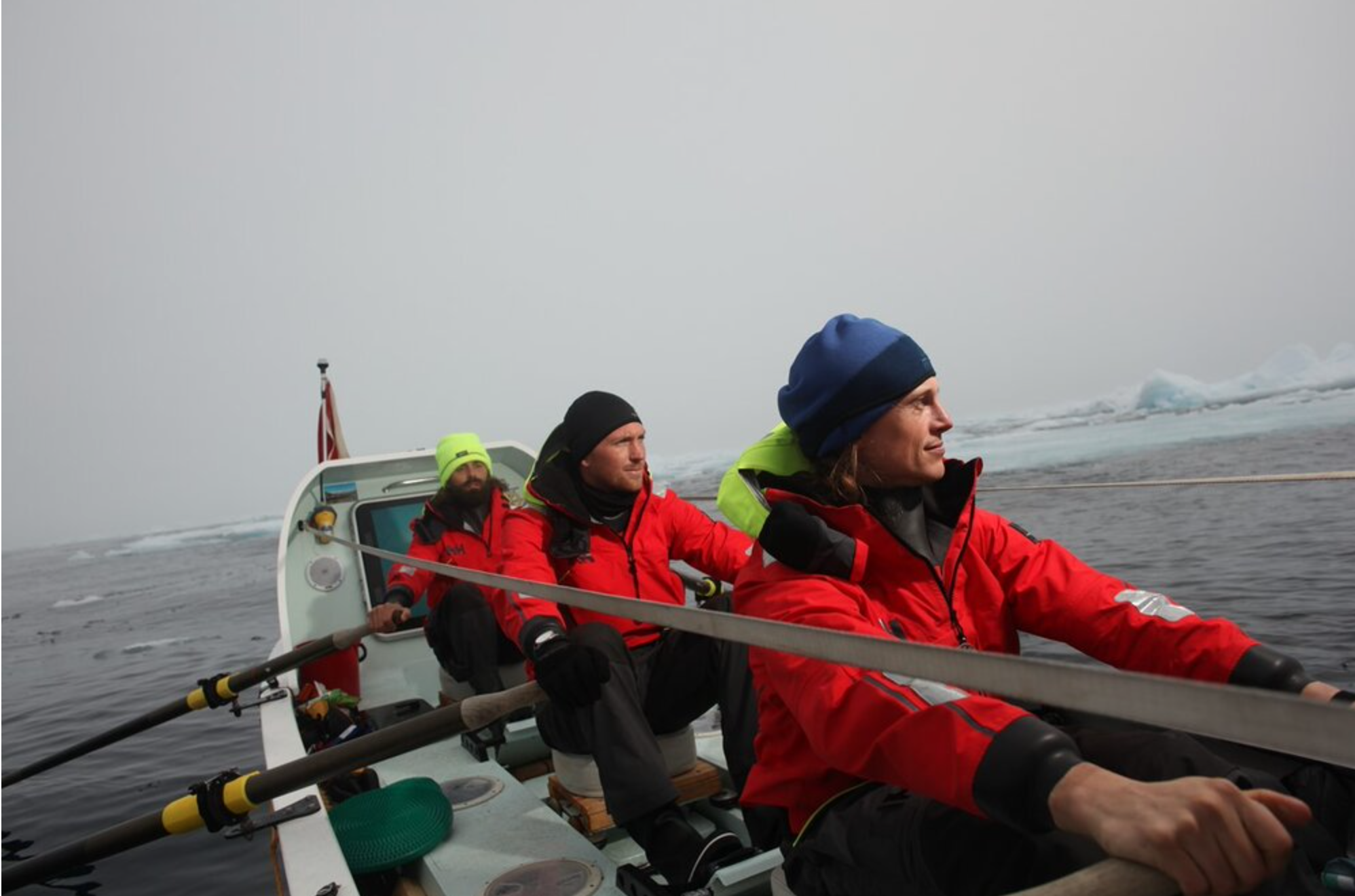
Fiann Paul
The Record-Setting Explorer, Trained Psychologist, Celebrated Artist, and All-Around Modern Renaissance Man Talks Overcoming Challenges, Breaking Records, and Rowing Across Some Very Cold Water
Most people who have created a huge catalog of photography and have created multiple major public art installations would refer to themselves as an artist.
Most people who had earned an advanced degree studying Jungian analytical psychology would refer to themselves as a psychologist.
And those of us who have broken nearly three-dozen Guinness world records while rowing across some of the most forbidding open waters on planet earth would fairly call ourselves explorer or adventurer, no?
For Fiann Paul, it would take all of those terms and more to begin to sum it all up, so he’s hardly playing loose with language when he refers to himself as a “Modern Day Renaissance Man.”
Dad Gear Review caught up with this celebrated ocean explorer — he has broken 33 world records at present and he is the only holder of the Ocean Explorers Grand Slam, having performed human-powered crossings on all five of earth’s oceans — artist, psychology expert, and generally interesting 42-year-old Polish-born, Icelandic citizen to discuss open water rowing, why the challenges of adventuring are more mental than physical, what Fiann has learned from indigenous people the world over, and what’s still on the to-do list for this accomplished adventurer.





We started off with what would usually be a pretty simple question…
What title should we use for you in writing?
“Definitely explorer,” Fiann Paul said, adding: “Ideally, you can call me Modern Day Renaissance Man, because it's my three careers actually that properly define me professionally. I mean it's not just that I touch things here and there, but I’ve really worked hard and properly and achieved something reasonable in fields of exploration and athletics, in psychology, and in art. So that would be the most flattering title if you're willing to use it.”
We were more than willing, because what else can you call someone who creates art, studies psychoanalysis and rows across the Drake Passage?
What first drew you to a life of adventure?
“I think exploration has always been my natural drive, and I believe that being an explorer — I personally believe this, because not everybody would agree with me — it's not just about embarking on expeditions, but it is basically an approach to life, and to me, exploration of the inner world was actually even more exciting, usually, than the exploration of the outer world. So I think I've always been at it, in many ways, and physical exploration has been the embodiment of my drive.”
“If I define my life retrospectively, and I mean retrospectively and currently, I would say my life was mainly about experience, self-expression, and meaning. And I think exploration has accommodated these two needs: the need for experience and self-expression. When I was starting earlier, I would say in the beginning of my first steps in life, I was more looking for fulfillment, and I believed a lot [of life] was about happiness or success.”
“But I think now, when I look at current or past moments, I think exploration helped center a part of my mental space, and I think it naturally emerged, how to put it, a sense of meaning. There is a very vague magnet bringing different pieces together somewhere there within us, giving us shape, and we are designing how we want to put ourselves out into the world. The world has to be able to host us; we have to be received somehow. Self-expression and seeking was always much more important to me than anything else, anything financial, say — or else my career would be probably of a different flavor — and those [interests] naturally crystallized as the drive within me found its way out to appear in the world.”
What do you consider to be your greatest accomplishment in the field of adventuring?
“Well, I honestly think my greatest accomplishment in general, including in adventuring, but in general, is finding my true self, yes? It's maybe odd to put that directly into adventuring, but I think allowing what wants to come to the world through me instead of accepting that I may be what the world wants me to be, or what others made me become, or how other forces shaped me.”
“Yes, I think that was the biggest expedition in my life, the biggest exploration; pulling myself apart, deconstructing myself, and putting myself back from scratch, from a sort of blank slate state back to a conscious version of me. As I said before, that extends the previous question, that exploration is not just about the expedition, but it’s an approach to life. And this has been the inner exploration, the one that probably is way more valuable, and doesn't always achieve notability in the outer world”
“If I were to speak to the very basic layer of the physical exploration, I would probably say that the biggest things are the Ocean Explorers Grand Slam, the rowing five oceans — I've been the first person to row four oceans, nobody else has so far rowed four oceans, and now also five, so that's quite a big advantage I’ve got over other explorers. And also the Grand Hat-Trick; I was the first person to three times hold three overall speed records.”
How do you keep your brain occupied when you're out there on the water for hour after hour? Do you force focus or let your mind wander?
“I am very much focused on the goal. That's honestly the only way to go through the expeditions which are aimed to achieve something, because if I were to focus on the moment, and try to just feel the experience of the moment? I think these expeditions are pioneering for one reason: because they're so difficult. For example, on the open waters of the Antarctic ocean, there have been only three expeditions in the whole history of the world.”
“As a comparison 500 people, approximately, have been to outer space, but just three boats have rowed on the open water of that Antarctic ocean. And two of those expeditions were led by me!”
“And I think the reason why nobody goes there is because it's so difficult, and also as a result it is unpleasant. And the only way to keep being driven by it is to see the goal on the horizon and hold onto it to basically be very dedicated to achieve this goal. And I think that's where my mind usually was. So I think I was willing to withdraw my, as I call it, pleasure-seeking parts of the mind; where we usually in life try to experience and set ourselves up with a comfortable place in a comfortable space — that's human nature — and being able to completely withdraw from it for a longer time and handle major discomfort in order to achieve the goal. In the language of Jungian archetypes, in depth psychology, we call it a warrior archetype primary function; the function of the warrior archetype is exactly to endure this hardship to achieve the goal. So it helps people who struggle with some difficult challenges to achieve them by exactly this shift in mindset, and I would say, perception as well.”
Are the struggles mostly physical, mostly mental, or is it an equal balance of a mental and physical game when you're in the middle of that kind of an adventure ordeal?
“I would assume it's mostly mental. Let's put it this way, some of the super fit people who do very well when it comes to physical challenges alone are not necessarily as good when the mental challenge is added to it. And a lot of the people who are good with the mental challenge alternately are not necessarily super physical types. There is definitely way more to it than fitness. So I don't know what kind of percentage I would give to it. It's at least 50% mental, but maybe more.”
“Then on top of it, of course, also comes your attitude towards elements. I mean, do you get scared when you see huge waves or can you settle with the fact that this is just a new reality, and your small boat being thrown around on these big waves is just the way it is? You have to start taking it as a new norm, which is absolutely abstract for some people. A lot of new rowers, when they see the open waters and huge waves coming at this small boat for the first time, they completely freak out, especially when they're made of frozen water, often spiced with pieces of ice! When you're on a big boat, this boat neutralizes the magnitude of waves. You don't really feel the impact of every wave. The boat has its own strong mass that counterweights the waves, but the small boat, like our boat, it 100% reflects the movement of the waters. So you feel every single bit of it.”
“And in comparison to this little boat, these waves are really huge, even though it's always difficult to capture them on camera because wide angle cameras are known to make everything smaller. If you shoot the mountains in wide angle, they just look like some tiny bits of shapes on the horizon, and it’s the same with waves. But the experience of this small boat receiving this big wave is pretty overwhelming. A lot of new rowers get a bit of a shock at the beginning, and only some of them can settle with the fact that this is a new norm. I think that's just one of the intense illustrations of the mental game.”
What advice do you have for people who are facing their own challenges, be they physical or of the mind?
“I think one of the big questions is, are you willing to bear the fear or even the pain of facing the unknown and going for the new, over the fear or the pain of being stuck? And I think that's a huge, huge part of Jungian psychology. It's how far you can go, and where is this balance for you? And I think this applies very well to life, as much as to exploration.”
Where do you find the inspiration for your art?
“Good question. I don't know if I find it outside more than inside, because I felt I always was led by some force within me, and I felt as long as I stayed authentic to it, the art was always turning out great. And whenever I try to compromise it, commercialize it, it always loses its magic very quickly. But I think if I were to name some external inspiration, I would probably give the credit to indigenous people. I always had a great appreciation for their sense of aesthetics as they embody their approach to life and their philosophy, which is very different than ours. And I often feel torn apart: I find myself a bit of a hybrid between these two worlds, because I know I consist a bit of theirs and a bit of the kind of modern world.”
“What I love about the indigenous sense of aesthetics is that individualism is not the goal; the harmony with the creation is the goal. Their art is not meant to promote an individual, but rather contribute to the community.”
“So it's communal, in a way, and often repetitive. It has a utilitarian function that's totally abstract or totally alien to our art. It tends to decorate utilitarian aspects of life. And it carries certain traditional information, and it's meant to increase harmony with [its] creation. You can see it when you look at it, when you look at the patterns, when you look at the visual aspects of their work, it's clearly pronounced.”
What are a few of the greatest goals that you still want to accomplish?
“Well, I have kind of dreamy goals that maybe I want to accomplish. For example, I would love to direct a film. I feel I'm an artist and a leader in one, which is exactly kind of the film director’s status. I have followed a bit of this path of being an artist and a leader… but I feel I would love to make a film. I love film and I am very much into ambitious cinema and I like to grow watching good films.”
“And other than that, there are personal goals, as well. And one of these goals would be to have a family. And I'm not stressed about it, but I think my life would feel incomplete if it were to end now, and feeling that this has not happened. And I think these are the two main goals, I would say. I have some other goals that, I mean, self-expression is definitely what I feel I achieved. I feel I have touched the world and I have experienced it as well.”
Photos C/O Fiann Paul

